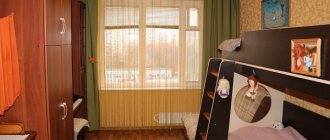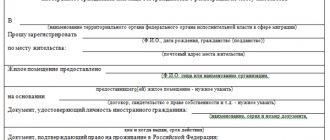Legal subtleties
Like any other housing, rooms can be owned by citizens or the state.
The registration procedure depends on its legal status
Until July 2008, registration in a communal apartment, regardless of housing status, required the consent of all residents , as well as a certificate from a medical institution confirming the absence of certain diseases. Currently, the law has excluded this condition.
A special feature of this property is the limitation of the owner's rights , which applies exclusively to square meters within one or more rooms.
The entire remaining territory is common property . In other words, the corridors, bathroom, kitchen, utility rooms within one apartment belong to all owners.
At the same time, their share is not allocated, and no one has rights to any specific territory within these premises. manage and use these square meters.
Registration is carried out in a specific room that belongs to the citizen or is provided to him by the authorities under a rental agreement.
Features of registration in a communal apartment
An apartment in shared ownership has much in common with communal housing, in which living space is distributed according to social tenancy agreements, or where the owners live, whose personal accounts per square meter are divided.
The legislation does not clearly define how the status of a communal apartment is assigned. Such objects may be the property of the municipality or belong to citizens.
(Article 42) establishes that a share in the ownership of common property in communal housing is equivalent to the ownership of a room.
The law does not oblige the co-owner of a communal apartment to obtain the consent of the other owners when registering third parties in the room.
In an effort to obtain registration in the capital and metropolitan areas, citizens agree to purchase part of a home and ask whether it is possible to register for a share of 2 square meters. And although the law does not establish a minimum size of living space that can be alienated by the owner, the widespread practice of such real estate transactions in recent years does not meet the expectations of buyers. They increasingly began to be denied registration with a tiny share in the common property.
Your meters
In accordance with the law, the owner of the premises has the right to fully dispose of the property at his own discretion. Consequently, registration for such living space is carried out in the same way as for a separate apartment.
The fact that there are common areas does not affect the registration procedure in any way.
The owner of the premises can register there himself, as well as register any person of his own free will. Consent and even notification of the intention to register someone on your territory from neighbors in a communal apartment are not required (Article 42 of the Housing Code of the Russian Federation).
If, in addition to the owner, other residents are registered, their consent will still be required.
Read about the procedure for registering in a privatized apartment on our website.
What to do if the co-owners are against it?
It is not always easy to obtain permission from the co-owners of an apartment. There may be several explanations for this, for example, conflictual relations between shareholders, antipathy towards the person who is going to be registered.
A situation may also arise when one of the owners is located in another place and there is no connection with him. Is it possible to register a person without the permission of other owners? There are no legal ways. If registration is critically necessary, then you can use workarounds.
One of these ways is to donate your share to a person who needs registration. You cannot sell your share without the permission of others, but you can give it as a gift. However, you should be extremely careful here, because the deed of gift transfers all ownership rights to the object, and the person who received such a gift may simply not return it. Such a risk is justified only if the transaction occurs between spouses.
Another unlikely option is to demand the allocation of a share in kind. If the co-owners of the property are categorically against the registration of a new tenant, then a court hearing can be initiated on the issue of dividing the living space. This is an extremely unprofitable option for all parties. The court very rarely gives approval for an allotment in kind, especially in apartments, because the living space must have such characteristics that separate premises with a separate entrance can be organized there. It is easier to divide a large private house in this way.
Municipal meters
The procedure for registering for rooms in a communal apartment, which is the property of the state, is much more complicated. The consent of all registered adult citizens will be required . In addition, permission must be obtained from the owner, that is, the city or village administration.
The authorities may refuse registration if, after a new tenant moves in, the total area for each resident in the communal apartment is less than 15-18 square meters (depending on the standards established by the regions).
The restriction does not apply to minors; they are registered in an apartment at the place of registration of one of the parents or other relatives, regardless of the size of the living space.
Read our article about the rules for registering in a municipal apartment.
Let's sum it up
Domestic legislation allows registration in an apartment and with shared ownership. In general cases, this requires the consent of the remaining shareholders, drawn up in writing. If a child of one of the owners is registered, then no consent is required.
To register a person in an apartment, you will need to visit the passport office at the address where the housing is located, providing the employees with all the necessary documentation.
If the shareholders do not agree to register a new person in the apartment, then the owner has 2 options - to allocate the property in kind if the appropriate technical capabilities are available, or to sell/donate the share to the person who planned to register in it. The last option is riskier.
Who will be registered without consent?
How many people can be registered there?
Consent is required only for third parties.
If the person being registered is a close relative of the tenant, the owner's consent is not required.
According to the law, the following relatives of the employer can be registered without any conditions:
- minor children (read about how to register a child without the owner’s consent);
- parents;
- spouse.
The registration of close relatives in municipal housing is accompanied by a change in the social tenancy agreement. Newly registered residents become tenants of the residential premises together with the person for whom the agreement was drawn up earlier.
Registration procedure
Registration of citizens at their place of residence is regulated by the Registration Rules approved by Government Decree No. 713 of July 17, 1995. According to this law, the procedure is carried out by FMS branches located in the given territory.
To obtain registration, you must submit an application on Form 6 and submit the following documents:
- passport;
- birth certificate (for children under 14 years of age);
- certificate of ownership or lease agreement;
- statement of consent of those registered (if necessary);
- municipal permit (for public apartments);
- departure slip;
- house book (for your own rooms).
All documents are submitted in the form of originals and copies .
If the consent of the residents of the apartment is required, their personal presence during the submission of documents is required.
If anyone registered is absent, you will have to wait for him or initiate the procedure for his discharge through the court .
It is also possible to carry out the procedure on the basis of a one-time power of attorney from a registered person or on the basis of a notarized consent in another city.
Important points when registering
Be sure to read the section because I will refer to this information often in the instructions below:
- To register in a municipal apartment with a close relative (to your spouse, to your children, to your parents) Consent of all adult residents is required, registered in this apartment. Close relationship with the employer/main tenant does not play a role here. All those listed are equal to each other. Clause 1 Art. 70 of the Housing Code of the Russian Federation - “The tenant, with the consent in writing of his family members, including those temporarily absent, has the right to move into the residential premises he occupies under a social tenancy agreement his spouse, his children and parents.” Clause 49 of the Order of the Ministry of Internal Affairs of December 31, 2017 N 984 - “Simultaneously with the application for registration at the place of residence, the applicant submits: written consent for the citizen to move into the residential premises from adult users living together with the tenant of the residential premises.” Clause 2 Art. 69 of the Housing Code of the Russian Federation - “Members of the family of the tenant of a residential premises under a social tenancy agreement have equal rights and obligations with the tenant.”
Registration with a non-close relative or non-relative will require the consent of all adult residents + consent of the municipality. For example, you want to register with your grandparents, uncle or aunt, and so on. Clause 1 Art. 70 of the Housing Code of the Russian Federation - “The tenant, with the consent in writing of his family members, including those temporarily absent, and the landlord, has the right to move other citizens into the residential premises he occupies under a social tenancy agreement as members of his family living with him.”There are exceptions: 1) Parents do not need to ask anyone’s consent to register their minor children with them - details. A separate article is about how to register a child in a municipal apartment. 2) No one’s consent is required for the tenant when registering in the housing provided to him on the basis of a social tenancy agreement - clause 2 of Art. 61 Housing Code of the Russian Federation.
- Registration will be denied if the registration norm for each resident is not met - clause 1 of Art.
70 Housing Code of the Russian Federation. It doesn’t matter who registers, kinship doesn’t matter here. Each city has its own accounting norm, because it is established by the local administration - Art. 50 Housing Code of the Russian Federation. In Moscow, a minimum of 10 sq.m. was established per person. - clause 3 of Art. 9 of City Law No. 29 of July 14, 2006. In St. Petersburg, a minimum of 9 sq.m. - clause 1 art. 3 of the City Law of July 19, 2005 N 407-65. For example, an apartment in St. Petersburg. It contains 3 people. Its area is 32 sq.m. The wife of one of the residents wants to register, everyone agrees to this. She will not be able to do this, because otherwise there will be 8 sq.m. for each person registered. This is below the established norm of 9 sq.m. The service will be refused. - The citizen must submit the application himself . You cannot register by proxy - more details.
- It is not necessary to check out from your previous address . When registering, it is enough to submit another application, then you will be automatically discharged from there within 3 days - clause 31 of the Decree of the Government of the Russian Federation of July 17, 1995 N 713.
- If you are a tenant under a social tenancy agreement and intend to register in the provided housing, the information below is not necessary for you. Go straight to the methods - through the passport office/MFC or through State Services.
If you want to register without being the tenant/main tenant, there is a lot of confusion about what document will be the basis for the procedure. Everywhere has its own requirements, in addition to the accounting norm.For example, a social tenancy agreement has been drawn up with the tenants and someone else wants to register with them (whether a relative or not). To do this, the employer will first need to include this person in the social tenancy agreement as a family member - clause 3 of Art. 69 and paragraph 2 of Art. 70 Housing Code of the Russian Federation. To do this, he contacts the municipality to draw up an additional agreement. Do not forget to obtain the consent of all adult residents. Instructions and list of documents for Moscow - link, for St. Petersburg - link. The registration period is up to 30 days. After this, you can register for housing.
If you only have a warrant, most likely, before registering someone, you should conclude a social tenancy agreement with the municipality. In this case, the order will be a foundation document, because it proves the fact of provision of housing for occupancy - Art. 47 Housing Code of the RSFSR and Art. 7 of the Federal Law of December 29, 2004 N 189-FZ. The same applies when the tenant or main tenant dies. All adult residents must decide which of them will be the current tenant, and the rest as members of his family - Art. 60 and 69 Housing Code of the Russian Federation. We also include in the contract the person who is going to register in the apartment. It is not necessary to draw up an agreement somewhere. For example, a friend of mine from Samara only had a warrant. Her husband was able to register with her, attaching a warrant and the written consent of all adult residents.
Another case - my relative from the Sverdlovsk region did not even have a warrant. He calmly registered his second wife. At the passport office they were asked for the written consent of his adult daughter, who is registered there, + a copy of the personal account to prove that the apartment was not privatized. They didn't have to re-register anything.
Conclusion: before registering, I advise you to first consult with a passport officer from the Management Company (housing office, housing department, homeowners' association, etc.). Even better is with the head of the passport office. Explain the situation in detail and provide all available documents for housing. They know more about this than MFC employees. Or write your situation to the Ministry of Internal Affairs of your city through the online application process. There, select “General Directorate for Migration Issues”.
Other articles
Privatization of an apartment - instructions, laws, deadlines
Other articles
Pros and cons of apartment privatization
Where to submit documents?
The collected package of documents can be submitted directly to the FMS office or to the MFC .
The application and documents can be submitted through the State Services portal (electronically) or by mail.
Registration through the MFC and State Services reduces the number of visits to the FMS.
In any case, the registration procedure is completed at the Federal Migration Service , since the registration stamp in the passport is placed exclusively by employees of this organization.
The registration procedure takes from 3 to 7 days and is absolutely free for citizens of the Russian Federation.









